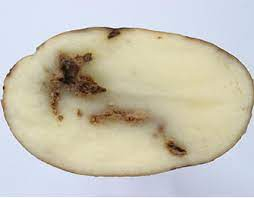Tobacco Rattle Virus (TRV) is a major plant virus that affects various crops such as potato, tomato, and pepper. Its effects on crop health can be severe, causing significant losses to farmers and farm owners. This article will provide an overview of the latest data on TRV, its development, and consequences on crop production.
Tobacco Rattle Virus (TRV) is a soil-borne virus that infects several crops and can cause a range of symptoms, including stunted growth, yellowing, and necrosis of leaves, and distorted or misshapen roots. According to the latest data from the United States Department of Agriculture (USDA), TRV has been reported in various states across the US, including Idaho, Washington, and Oregon.
The development of TRV is mainly through soil-borne vectors such as nematodes, which can transmit the virus from infected to healthy plants. Once infected, the virus can remain in the soil for an extended period, making it difficult to control.
The consequences of TRV on crop health can be significant, causing economic losses to farmers and farm owners. A study by the USDA estimated that TRV can cause yield losses of up to 70% in potato crops, leading to a loss of revenue of up to $80,000 per hectare.
To mitigate the impact of TRV on crop health, farmers and agronomists need to implement preventive measures such as crop rotation, the use of nematode-resistant cultivars, and the use of certified disease-free planting materials. Additionally, the use of soil fumigation and the elimination of weed hosts can help reduce the incidence of TRV infection.
In conclusion, TRV is a significant threat to crop health and can cause severe economic losses to farmers and farm owners. Implementing preventive measures such as crop rotation, the use of nematode-resistant cultivars, and certified disease-free planting materials, can help mitigate the impact of TRV on crop production.
#TobaccoRattleVirus #TRV #PlantVirus #CropHealth #Agriculture #Farming #Nematodes #PreventiveMeasures #SoilFumigation #CropRotation #Cultivars #USDA #EconomicLosses #FarmOwners #Agronomists #Farmers #PlantPathology #PlantDiseases







